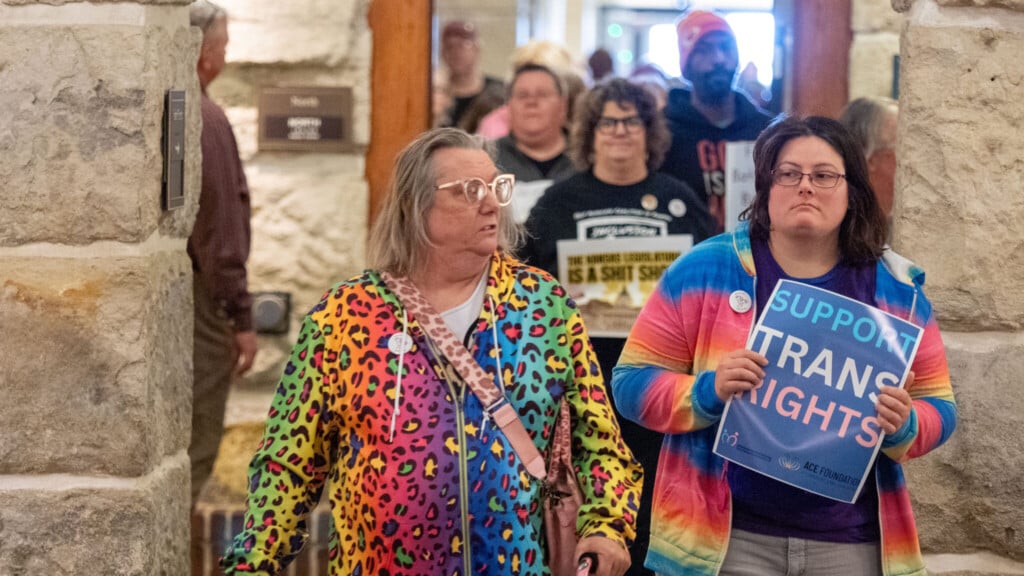Execution team ‘membership’ argued in appeals court

Who gets to wear the black hood?
The Missouri Court of Appeals in Kansas City considered that question last week. A three-judge panel heard arguments in a case over whether the Missouri Department of Corrections can keep secret the suppliers of its lethal-injection drugs.
The department has tried to expand the protections of the state’s so-called “black hood law,” which conceals the identities of people who carry out executions. The state believes the pharmacists who compound the drugs are members of the “execution team.”
The Guardian, a British newspaper, and other news organizations sued the state in 2014, arguing that information about the execution drugs should be disclosed under the Sunshine Law. A circuit court judge in Jefferson City sided with the media and ruled that the pharmacists who provide the Department of Corrections with pentobarbital do not provide “direct support” for the administration of the lethal drug. The court further awarded $134,790 in costs and attorney fees, saying the state had knowingly violated the Sunshine Law.
The state appealed the verdict, and the records were kept under seal.
The state’s position is that the Missouri Legislature delegates authority to define the execution team to the Department of Corrections. Protecting execution team members’ identities is essential to the process, the state says. “The death penalty has many vocal opponents who may seek to harass or harm individuals that participate in state-sponsored executions,” the appeal states.
The state established a new, “one-drug” protocol for executions in fall 2013. In court records, that state identifies the pharmacists who supply the drugs as “M6” and “M7.” Missouri prison officials pay the pharmacists and other members of the execution team in cash-stuffed envelopes in order to limit the paper trail.
Missouri officials have worked to protect the identity of pharmacists as execution drugs have become harder to obtain. Pfizer and other pharmaceutical companies have restricted their products from being used for capital punishment; the European Union bans the export of execution drugs. As a result, prisons in death-penalty states have turned to more loosely regulated compounding pharmacies.
The Pitch reported in early 2014 that a pharmacy in Tulsa was a likely source of Missouri’s execution drugs. Earlier this year, the pharmacy, the Apothecary Shoppe, auctioned off its assets after admitting to nearly 2,000 violations of state pharmacy guidelines.
In court last week, the state solicitor, James Layton, acknowledged that the state was unable to purchase execution drugs on the open market. Layton argued that the obstacles to obtaining lethal-injection drugs supported the idea that the pharmacists could be classified as members of the execution team. He drew a distinction between the pharmacists who supply a drug with only one purpose and the mechanics who maintain vehicles that transport inmates to the death house. The pharmacists, he argued, provided direct support. The mechanics’ efforts were indirect.
The case consolidates the Guardian’s lawsuit with suits brought against the Department of Corrections by Joan Bray, a former Missouri state senator, and the Reporters Committee for Freedom of the Press.
Elizabeth Unger Carlyle, Bray’s attorney, argued that the elusiveness of execution drugs did not allow the Department of Corrections to rewrite the rules. “If things change, there is a body in Missouri that’s supposed to change the statute to assist the Department of Corrections in carrying out its functions,” she said. “That body is known as the Missouri Legislature.”
In addition to arguing about whether the black hood should cover pharmacists, the lawyers debated whether the Department of Corrections had violated the Sunshine Law. In its appeal, the state argues that an interpretation of the Sunshine Law that’s later judged to be incorrect is not necessarily a “knowing” violation. Layton noted that most records custodians are not lawyers. “They’re doing they best that they can,” he said.
After establishing the new protocol in 2013, the state of Missouri executed 18 men in a span of less than two years. The pace slowed as the number of death-row inmates who had exhausted their appeals dwindled. Earl Forrest, who killed three people, including a sheriff’s deputy, in the southern Missouri town of Salem in 2002, was the only state prisoner executed in 2016.




